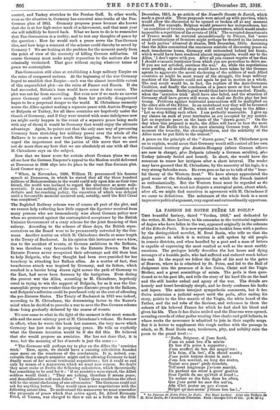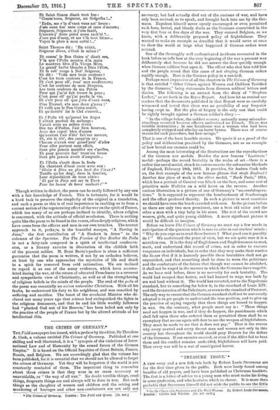LA PASSION DE,NOIRE FRtRE LE POILtl* Tuts beautiful fantasy, dated
" Verdun. 1916," and dedicated by the-writer, M. Marc Leclerc, to his comrades in the territorial regiments of Anjou who have fallen in the war, appeared originally in the columns of the Echo de Paris. it is now reprinted in booklet form with a preface by the distinguished novelist, M. Rene Bazin, who tells us that the Anjou patois in which it is written is still -spoken by old people in remote districts, and when handled by a poet and a man of letters is capable of expressing the most exalted as well as the most earthly emotions. The prologue briefly describes the last hours and dying messages of a humble poide, who had :suffered and endured much before his end. In the sequel we follow the flight of his soul to the gates of 'Heaven, where he is admitted by St. Peter, and led to the Hall of Judgment into the presence of le bon Gale% Christ and 'the Virgin Mother, And a great assemblage of saints. The poi/a is then ques- tioned as teshis past life, and tells the story of his hard life on the land and the still harder ordeal and agony of • the war. The details are homely and -heart-breakingly simple, and he freely confesses his faults and lapses. The saints interject sympathetic comments, but /e bon Guieu maintains a judicial aspect until the poilu, after ending his story, points to the blue mantle of the Virgin, the white beard of the Father, and the red robe of the Saviour, and welcomes in them the colours of his beloved France for which he had shed his blood and given his life. Then le'bon Guic-a smiled and the Heavens were opened, revealing crowds Of other poilus wearing blue cloaks and gold helmets, in whose ranks the newcomer is admitted to join in their angelic songs. But it is better to supplement this rough outline with the passage in which, as M. Rene Bazin says, tenderness, pity, and nobility raise the poem to the grand level :- "' Enfan, Seigneur, si j'ons J'ons eu aussi ben .dla misere
Et ben &la pine h supporter ; J'ons sonffert de ben des xnagniSres D'la faim, .d'la fret', dla fraud anssit ; J'ons point terjous dormi la nuit ; J'ons ben souvent, an long des routes, Trains men panv' plods 'scorches, Tell'ment longterrins raviolis marsb6, En pardant ma -sucur lV -gross' gouttes Sdus l'poids du sac qu'etait si lourd Ya meime en des foes, dans lea cotes, Qne j'ons porte les sacs des aut'es, Alin dlen porter un peu ewers Malgre qti'moi-meim' retions ben las
• La Passion de Notre Pthe Le Poilu. Par Marc Leclerc. Avec une Prllace de Ii. Ilene Basin, de l'Aeaderaie Franesise. Paris Georges Ores et Cie. it fr. 25 e.]
Et Saint Simon disait tout bas :
Comra'nous, Seigneur, an Golgotha !...' Enfin, me vla d'vant vows ast' heure : d'ses erne am' sans corps at sans d'meure ; Seigneur, Seigneur, si j'ons faute,
L'aurais-j' done point asset rach'te ?... d'ons pus d'sang, et me v'lh tout Mime... Yeses la plaie it mon carte !...'
Saint Thomas dit : ' En Write, Seigneur Jesus, c'etait la memo
Et comm' le Bon Onion n' disait ren, • que l'Poilu montra d'la main Le ma:items bleu d'la Vierge Mere, La grand' barbs blanche A Dieu l'Pere, Et la rob' rouge h Not' Seigneur, Et dit : Voila mos trois co:deers! C'est les trots couleurs de is France, Et c'est pour ell', tout' mes souffrances ; C'est les couleurs de mon Drapeau, Lea trois couleurs de ma Patrie Pour qui j'm'ai fait trouer In peon ; C'est pour ell' qu'j'ai perdu la vie, Et c'est pour ell que rses d'vant vorts, Pere 2ternel, ate. mes deux g'noux 1' Et veil& que le Bon Guieu sourit, Et qu'darrier' lui le Clel s'ouvrit...
Et r Poilu vit qu'parmi les Anges I s'etait produit du mélange :
Yavait assis an milieu d'eux Des tas d'Poilus, Fair bien heureux, Avec des °spot' bleu d'azure
Qu'avaient Fair d'ete fait'sur mesure, Et, sits la Vet', des casqu'en or ; Chacun n'avait ems' grand'pair' d'ailea Pour aller partout sans effort,
Sans pets jamais mouiller sea s'melles, Et pour pouvoer fair' trent'six lieuea Sans pits jamais avoer d'ampoule...
Et rPoilu s'assit dans la fouls En chantant d'tout cecur avec eux : Moire d Dieu au plus haul des Cieux I '. Tandis qu'les Ang', dans Is lumiore, Leur repondaient do taus cotes : ' Et qua la Paix soit sur la Terre Pour les homm' de boon' voulonti I ' "
Though written in dialect, the poem can be easily followed by any one with a fair knowledge of French. This is fortunate, for it would be a hard task to preserve the simplicity of the original in a translation, and such a poem as this is of real importance in enabling us to form a correct notion of the regenerating effect of the war on the spirit of France, which too many of us are perhaps inclined to identify, where religion is concerned, with the attitude of official secularism. There is nothing quite like the poem to be found in the verses, often deeply religions, which have come from the officers and men in our own trenches. The nearest approach to it, perhaps, is the beautiful masque, " A Passing in June," the first contribution of " A Student in Arms " to the columns- of the Spectator. For The Passion of Our Brother the Poilu is not a fairy-tale composed in a spirit of intellectual condescen- sion, or a literary exercise in illustration of the childish faith of the peasant soldier. M. Reno Bazin's preface is alone a sufficient guarantee that the poem is written, if not by an orthodox believer, at least by one who approaches the mysteries of life and death in a spirit far removed from cold rationalism. We are inclined to regard it as one of the many evidences, which have accumu- lated during the war, of the return of educated Frenchmen to a reverent and sympathetic view of Christianity, as well as of the strengthening of religious beliefs in the minds of the people. The soul of the poilu of the, poem was essentially an anima naturaliter Christiana. With all his faults, he understood his duty to his neighbour, and was ennobled by suffering and sacrifice. The boast of the secularist Minister who de- clared not many years ago that science had extinguished the lights in the religious firmament, and that he and his little worldly followers had "plucked God out of his Heaven," has been belied not only by the practice of the people of France but by the altered attitude of her intellectual Hite,



































 Previous page
Previous page